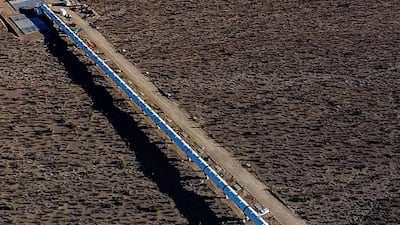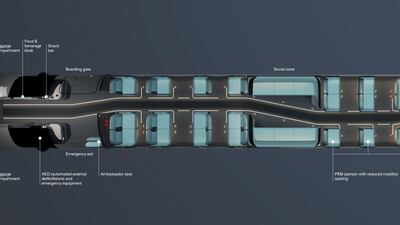It has been widely suggested that Elon Musk's purchase of Twitter will mean he will focus less on his other companies, such as electric vehicle maker Tesla and aerospace company SpaceX.
However, amid the Twitter sale drama, there has been an update from Boring Company, one of the lesser known of Mr Musk's many ventures. The tunnelling company is working on a high-speed hyperloop transport system and announced on Tuesday that it is nearing a major milestone.
“Hyperloop testing at full-scale begins later this year,” Boring Company tweeted.
Mr Musk tweeted just hours earlier that Boring would attempt to build a working hyperloop, adding that “from a known physics standpoint, this is the fastest possible way of getting from one city centre to another for distances less than 2,000 miles. Starship is faster for longer journeys".
“Underground tunnels are immune to surface weather conditions (subways are a good example), so it wouldn’t matter to Hyperloop if a hurricane was raging on the surface. You wouldn’t even notice," he added.
Hyperloop has been mooted for years
Yes, it has. Mr Musk first published his white paper in 2013 outlining a high-speed transportation system he called the hyperloop.
The system sees magnetic levitation pods carrying people at up to 1,200 kilometres per hour — nearly three times faster than a conventional high-speed rail — in tubes either above or below ground, with plans to build a hyperloop capable of ferrying passengers between New York and Washington in 29 minutes.
After sharing his specifications in 2013, he said he didn’t plan to execute “because I must remain focused on SpaceX and Tesla".
In 2017, his hyperloop project completed its second phase of testing in Nevada, though progress then fizzled out.
What other companies are building hyperloop systems?
There's Hyperloop Transportation Technologies, which late last year unveiled the passenger cabin of a new high-speed hyperloop pod in which travellers could ride in luxurious comfort at speeds approaching 1,000 kph.
The full-scale passenger pod can accommodate 30 people and offers a personalised travel experience.
The capsule will be installed in the company’s first commercial passenger prototype system and features artificial skylights, an advanced air purification system, interactive displays, digital wayfinding, personal tablets and biometric sensors.
Hyperloop TT unveiled its Quintero One capsule in Spain in 2018 and has since tested at a 320-metre track in Toulouse, France.
The company has been working with governments around the world to create the necessary legal framework to bring the travel system into the mainstream.
A deal was also signed in 2018 for a transport hub and an innovation centre for continuing research and development by Hyperloop TT at Aldar's Seih Al Sdeirah land bank in Abu Dhabi.
Then there's the Virgin Hyperloop, which after successful passenger testing in November 2020, is seeking regulation and certification of hyperloop systems in cities and countries around the world. It predicts commercial operations as early as 2027.
DP World, the world’s biggest ports operator by volume, is the largest shareholder in the US-based company and plans to use the system to transport cargo in the future.
Virgin Hyperloop unveiled its transport pods at the DP World pavilion within Expo 2020 Dubai.
Abu Dhabi's Mohamed bin Zayed University of Artificial Intelligence in 2020 also signed a preliminary agreement with Virgin Hyperloop to collaborate on research to develop the futuristic transport system.
Under a proposed UAE scheme, Virgin Hyperloop One’s pods would take just 12 minutes to cover the distance between Dubai and Abu Dhabi. It currently takes about 1 hour 20 minutes to drive between the two cities.
Spanish start-up Zeleros said it would have a working prototype of a hyperloop ready to carry cargo in the port of Valencia by the end of next year.
Juan Vicen, co-founder and chief marketing officer of Zeleros, told The National the company is also working on passenger pods that will carry 50 to 200 passengers. The technology to test with passengers is expected to be ready by 2030.
What will the Boring Company do now?
Last week, the Boring Company disclosed a new funding round that raised $675 million, led by Vy Capital and Sequoia Capital. The round values the start-up at $5.675 billion, the company said.
It has a tunnel system in place at the Las Vegas Convention Centre, and transported passengers at the CES conference earlier this year.
Its Vegas Loop project, located in Las Vegas, is a 47km tunnel network connecting 51 stations. Vegas Loop is the largest subsurface transportation project in the US and targets throughput of up to 57,000 passengers per hour.
The company aims to expand in other cities in coming years and said it would use the latest round of funding to “significantly increase hiring”.
It is currently advertising for several vacancies, including roles in engineering and operations.














